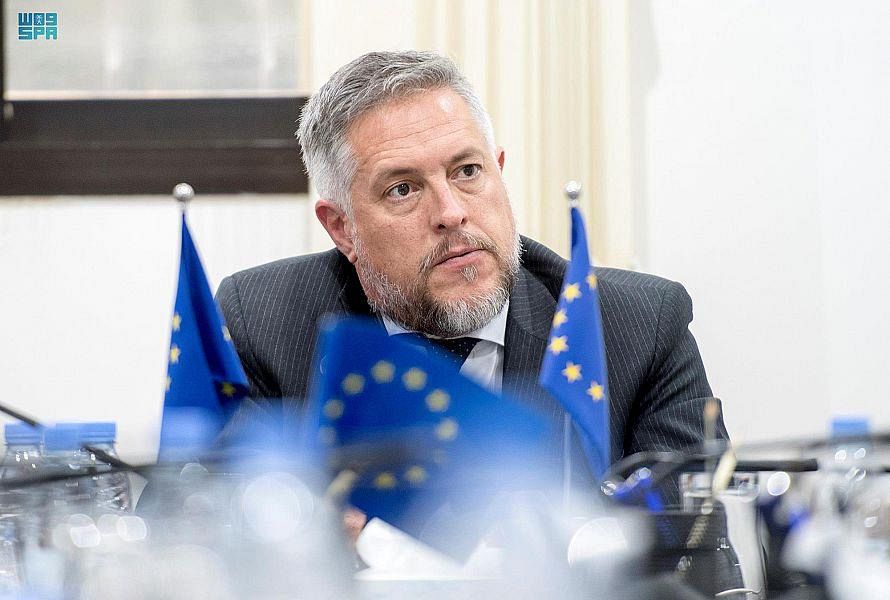
The past few weeks have brought positive developments in Iraqi-Saudi relations. These promising signs began with the Saudi Arabian leadership last month congratulating the newly appointed Iraqi Prime Minister Mustafa Al-Kadhimi on gaining the confidence of the Iraqi Parliament. Subsequently, Crown Prince Mohammed bin Salman spoke with Al-Kadhimi on the phone, discussing several bilateral and regional issues. Crown Prince Mohammed even invited the Iraqi PM to visit Saudi Arabia. While the invitation may be a diplomatic gesture, it was warmly welcomed and sincerely felt on both sides.
Then, last week, Iraq’s Deputy Prime Minister and Acting Minister of Finance and Oil Ali Allawi arrived in Riyadh, where he met several officials. During the visit, Allawi had discussions with Saudi ministers on several issues of mutual concern, as well as on the current state of relations between the two countries.
According to the Saudi Press Agency, Allawi and Saudi Energy Minister Prince Abdul Aziz bin Salman discussed common concerns in the energy sector and ways to stabilize the oil market. They also touched on several other issues, including border ports, customs relations and developing private sector partnerships. In addition, they emphasized the importance of forming a joint business council between the two countries and discussed the upcoming assignment of Saudi Arabia’s commercial attache to Iraq and the intensification of efforts to reopen the Jadidah Arar border crossing.
These steps complement the moves initiated during the era of former Iraqi Prime Minister Haider Abadi, when Iraq’s relations with its Arab neighbors witnessed a palpable, if relatively modestly paced, boost.
Despite the post-2005 efforts of the Iranian regime and its regional proxies to remove Iraq from its Arab sphere, Iraqis are now once again embracing Arabism, as well as their own history and culture, to shape their country’s future. Given its unique, millennia-long history, Iraqis live and breathe Arab civilization and are surrounded by its monuments and landmarks.
These clear truths and realities are integral to Iraq’s Arab identity, which no Iraqi should cede, irrespective of religion or sect. Iran’s short occupation cannot remove or erase the strong Arab roots that are entrenched in the minds of the Iraqi people. Iran’s presence will, in the future, be merely a dark page in the vast volumes of books that make up Iraq’s illustrious history.
During my meetings with Iraqi officials and bureaucrats in the past year, in or outside Iraq, I regularly felt a constant sense of joy and a sincere welcome, especially when they realized I was from Saudi Arabia. I frequently heard statements like: “You’re our family. We are part of you and live in you. We look forward to your coming. Don’t abandon us.” I sincerely believe that these warm expressions are genuine and heartfelt statements of fraternal love emanating from Iraqi souls that find a resting place in Saudi hearts.
Iraq has vast potential and the Iraqi people must rise to reclaim it from all malign forces that wish to harm and weaken it. To achieve this, Iraq needs to be more open to and develop closer ties with the Arab world, while the Arab and Gulf states should stand by Iraq, which will serve the interests of both sides. We also need to intensify our meetings and visits with our Iraqi brothers of all factions and affiliations.
There appears to be a definite need for foreign investment, especially from the Gulf states. Although there are some legal impediments at present, we should accelerate efforts to remove them. In this respect, Iraqis need to understand that “investors are cowardly,” with potential investors needing certain guarantees before they will enter the Iraqi market, given the turbulence of recent years. A primary starting point for the Iraqi government would be to bolster and accelerate the fight against corruption, ease bureaucratic red tape, and intensify efforts to transform the country from a security state to a normal, modern nation. In addition, the Iraqi government needs to ensure an inclusive vision for all members of society.
However, despite this optimism of Iraq turning a corner, we must acknowledge some uncomfortable truths and concede that there are some factions that do not want Iraq to develop close ties with its Arab and Gulf neighbors. These factions actively work to undermine these countries to prevent Iraq moving closer to them. They either work as part of Iran’s regional propaganda operation or are naive and unaware of Tehran’s true objectives in Iraq. The Iranian regime seeks to dominate Iraq and its resources and remove it from its natural sphere and depth as a great Arab nation.
Iraqis are now once again embracing Arabism, as well as their own history and culture, to shape their country’s future.
Dr. Mohammed Al-Sulami
The latest of these attempts to thwart the development of positive relations between Iraq and Saudi Arabia was a statement issued by Hezbollah’s Iraqi affiliate following Allawi’s visit to the Kingdom. It threatened to carry out operations against Riyadh and called on the Iraqi government to criminalize any Saudi presence in Iraq. The statement was issued by Abu Ali Al-Askari, a security official of the Iranian-backed Kata’ib Hezbollah, on the popular messaging app Telegram on May 23.
Terrorist factions of this nature cannot be weakened without continuous communication between Iraq and other Arab nations, particularly the Gulf states. Such communication will also accelerate the integration of Iraq within the Arab sphere at both the political and popular levels. It must be emphasized, however, that this will require extraordinary efforts from both sides to build and bolster mutual confidence.
Dr. Mohammed Al-Sulami is Head of the International Institute for Iranian Studies (Rasanah). Twitter: @mohalsulami







